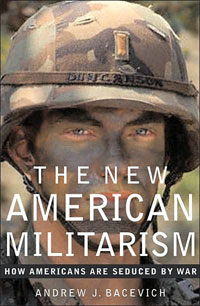Book Notes
 Andrew Bacevich, The New American Militarism; How Americans Are Seduced By War (New York: Oxford University Press, 2005), 270pp.
Andrew Bacevich, The New American Militarism; How Americans Are Seduced By War (New York: Oxford University Press, 2005), 270pp.
In his book The New American Militarism (2005), Andrew Bacevich desacralizes our idolatrous infatuation with military might, but in a way that avoids the partisan cant of both the left and the right that belies so much discourse today. Bacevich's personal experiences and professional expertise lend his book an air of authenticity that I found compelling. A veteran of Vietnam and subsequently a career officer, a graduate of West Point and later Princeton where he earned a PhD in history, director of Boston University's Center for International Relations, he describes himself as a cultural conservative who views mainstream liberalism with skepticism, but who also is a person whose "disenchantment with what passes for mainstream conservatism, embodied in the present Bush administration and its groupies, is just about absolute." Finally, he identifies himself as a "conservative Catholic." Idolizing militarism, Bacevich insists, is far more complex, broader and deeper than scape-goating either political party, accusing people of malicious intent or dishonorable motives, demonizing ideological fanatics as conspirators, or replacing a given administration. Not merely the state or the government, but society at large, is enthralled with all things military.
Our military idolatry, Bacevich believes, is now so comprehensive and beguiling that it "pervades our national consciousness and perverts our national policies." We have normalized war, romanticized military life that formally was deemed degrading and inhuman, measured our national greatness in terms of military superiority, and harbor naive, unlimited expectations about how waging war, long considered a tragic last resort that signaled failure, can further our national self-interests. Utilizing a "military metaphysic" to justify our misguided ambitions to recreate the world in our own image, with ideals that we imagine are universal, has taken about thirty years to emerge in its present form. It is this marriage between utopians ends and military means that Bacevich wants to annul.
How have we come to idolize military might with such uncritical devotion? He likens it to pollution: "the perhaps unintended, but foreseeable by-product of prior choices and decisions made without taking fully into account the full range of costs likely to be incurred" (p. 206). In successive chapters he analyzes six elements of this toxic condition that combined in an incremental and cumulative fashion.
After the humiliation of Vietnam, an "unmitigated disaster" in his view, the military set about to rehabilitate and reinvent itself, both in image and substance. With the All Volunteer Force, we moved from a military comprised of citizen-soldiers that were broadly representative of all society to a professional warrior caste that by design isolated itself from broader society and that by default employed a disproportionate percentage of enlistees from the lowest socio-economic class. War-making was thus done for us, by a few of us, not by all of us. Second, the rise of the neo-conservative movement embraced American Exceptionalism as our national end and superior coercive force as the means to franchise it around the world. Myth-making about warfare sentimentalized, sanitized and fictionalized war. The film Top Gun is only one example of "a glittering new image of warfare." Fourth, without the wholehearted complicity of conservative evangelicalism, militarism would have been "inconceivable," a tragic irony when you consider that the most "Christian" nation on earth did far less to question this trend than many ostensibly "secular" nations. Fifth, during the years of nuclear proliferation and the fears of mutually assured destruction, a "priesthood" of elite defense analysts pushed for what became known as the Revolution in Military Affairs (RMA). RMA pushed the idea of "limited" and more humane war using game theory models and technological advances with euphemisms like "clean" and "smart" bombs. But here too our "exuberance created expectations that became increasingly uncoupled from reality," as the current Iraq debacle demonstrates. Finally, despite knowing full well that dependence upon Arab oil made us vulnerable to the geo-political maelstroms of that region, we have continued to treat the Persian Gulf as a cheap gas station. How to insure our Arab oil supply, protect Saudi Arabia, and serve as Israel's most important protector has always constituted a squaring of the circle. Sordid and expedient self interest, our "pursuit of happiness ever more expansively defined," was only later joined by more lofty rhetoric about exporting universal ideals like democracy and free markets, or, rather, the latter have only been a (misguided) means to secure the former.
Bacevich opens and closes with quotes from our Founding Fathers. In 1795, James Madison warned that "of all the enemies of public liberty, war is perhaps the most to be dreaded, because it comprises and develops the germ of every other." Similarly, late in his life George Washington warned the country of "those overgrown military establishments which, under any form of government, are inauspicious to liberty, and which are to be regarded as particularly hotile to republican liberty."


